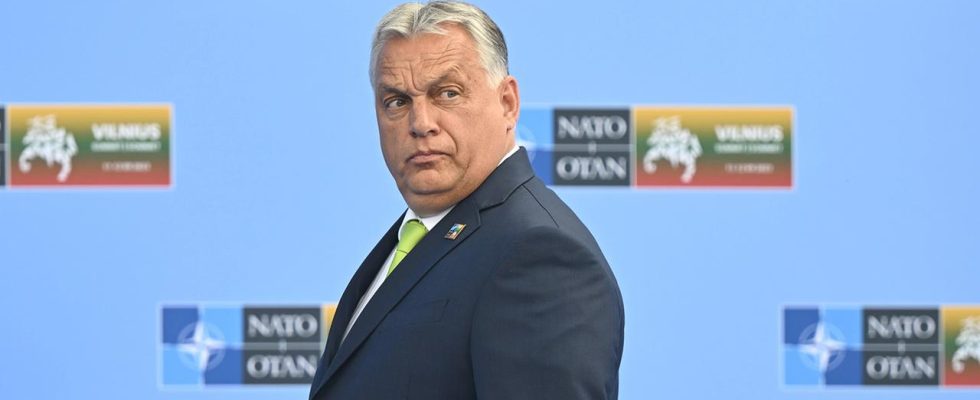background
Whether Sweden’s accession to NATO or a new EU migration policy: Hungary’s Prime Minister Orban is repeatedly noticed by blocking cooperation in international alliances. What’s behind it?
The next blackmail has already been conjured up: On Friday last week, Hungary’s Prime Minister Viktor Orban made it clear that he thinks little of Ukraine’s EU accession prospects.
Before accession talks could even begin, “very difficult questions” would have to be answered, Orban said on state radio.
The EU countries want to decide in December whether accession talks can begin. This would require a unanimous decision. So Orban is once again setting up a threatening scenario.
Blockade when it uses
Because it is exactly such unanimous decisions that Orban repeatedly uses to shoot across the board in the European Union and also in the NATO defense alliance.
Some examples: Hungary obtained an indefinite exception to the EU oil embargo against Russia under threat of a blockade.
In addition, the country has been blocking the payment of billions of EU dollars to Ukraine since May as part of the so-called peace facility. Because Ukraine had listed the Hungarian bank OTP on a “warmongers list”. Now Kiev has revised that – and Hungary could clear the way for the billions. But only in return for this.
And as long as Ukraine does not restore language rights for minorities in schools for the Hungarian minority, Hungary does not want to support Ukraine in international affairs. Orban said this in parliament at the beginning of last week. At the end of the week, the critical statement about Ukraine’s possible EU accession talks followed.
challenges for alliance partners
At the NATO level, Hungary is also making life more difficult for its allies: Hungary only allows arms deliveries across its territory if they do not go directly to neighboring Ukraine.
And for months now, the parliament in Budapest has simply not put Sweden’s entry into the defense alliance on its agenda. Viktor Orban has repeatedly accused Sweden of supposedly spreading lies about the desolate state of Hungarian democracy and the rule of law.
He used reporting by independent media as examples. A circumstance that illustrates his idea of freedom of the press.
Separation from external “enemies”
The increasing power of Orban and his Fidesz party may be one of the reasons why Orban repeatedly attacks the EU and other allies.
This power also lives from the fact that Orban acts as the sole protector of Hungary, its majority white and Christian population, and the country’s identity and language.
To paint this picture, he uses the distinction from external “enemies” – be it Brussels, Muslim migrants or a supposedly overly critical Sweden.
Orban is working on expanding power
Political analysts repeatedly say that Orban’s removal from office in 2002, after his first term in office, hit him hard. Since his re-election in 2010, he has worked tirelessly to expand and stabilize his power.
This also includes giving Hungary as many advantages as possible at the international level. For example, through billions in payments from the EU. Hungary is one of the largest net recipients.
However, since the rule of law proceedings against Hungary began, Orban has had an income problem. The country is also suffering from an economic crisis and high and stubborn inflation.
Remain allies
Despite his alliance minimalism, it is not foreseeable that Orban would be isolated internationally. There are always states that support Budapest’s course. Turkey, for example, has not yet approved Sweden’s entry into NATO.
In addition to Hungary, Poland, the Czech Republic, Slovakia, Bulgaria and Malta initially did not agree to the EU’s asylum compromise, which does not require unanimity.
After the Spanish Presidency put a compromise proposal on the table last week, diplomats said two naysayers remained: Poland and Hungary.
The Austrian government also maintains good relations with Orban and works closely with Hungary on border protection, for example. Together with Poland and Slovakia, Hungary is also sticking to import restrictions on Ukrainian grain, even though the EU Commission had lifted them.

